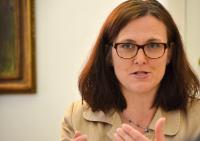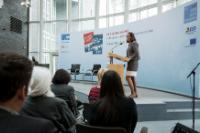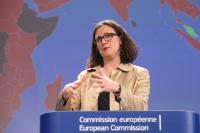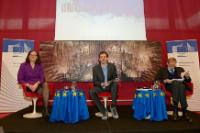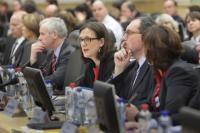Additional tools
What I do

Visiting a school for Roma children in Pristina, Kosovo, in January 2012. Photo: European Union Liaison Office
Results achieved 2010-2014
As the Commissioner responsible for the Home Affairs portfolio in the European Commission, my focus is on two main policy areas: migration and security.
In the field of migration, I am working to put in place a Common European Asylum and Migration System, based on solidarity and respect for fundamental rights, through which we treat people with dignity and decency. Europe needs to give protection to those in need, and EU Member States need to demonstrate solidarity. At present, ten countries receive 90 percent of all asylum applications in the EU, meaning that 17 countries could and should do a lot more.
Europe also needs consistent control of its external borders in order to address irregular migration as well as trafficking in human beings, while at the same time tackling the root causes of migration, such as poverty, conflicts and lack of democracy. There also need to be more legal ways to reach Europe, making it easier for third country nationals to come here for work. Following the Arab spring, I am engaging with our southern neighbourhood and our Eastern partners to facilitate mobility via so called mobility partnerships, covering asylum issues, irregular migration and trafficking, legal migration and visa facilitation.
Freedom of movement and openness are among the EU's core values, and we need to protect and safeguard achievements such as the Schengen area, which enables us to travel from the Mediterranean to the Arctic Circle without showing a passport.
In the field of security, Europe needs to take on the threats of organised crime and terrorism together, through effective cooperation between the Member States' law enforcement authorities and EU agencies. We need to make it easier for the police to hit organised crime where it really hurts – by going after their profits. A major source of income for such criminal groups is trafficking in human beings, the slave trade of our times, which is on the rise within and amongst EU countries. Such crimes need to have equal gravity in courts across Europe, and member states must give care and support to victims. Dedicated action is also needed to help children who end up in the clutches of traffickers.
Another focus for organised crime groups is cyber crime, such as online fraud and credit card theft. Better coordination at EU level is key in dealing with this borderless and highly profitable activity – cyber criminals should not be allowed to disrupt our digital lives.
My political portfolio as Commissioner also contains the fight against corruption in Europe, where we need political will and commitment by decision-makers at all levels. Four out of five EU citizens think that corruption is a serious problem in their home country.
As Europe works together to prevent terrorism, the understanding of the processes behind radicalisation is vitally important. As part of my work, I have established the Radicalisation Awareness Network, which will bring people who are working at the local level together to prevent radicalisation. At present, we do not know enough to fully understand the processes that lead to extremism and make people commit violence.
In all my work, the respect for privacy and personal integrity is of vital importance. All actions in this field – including, for example, data collection in the fight against organised crime – must be proportional and justified.
Among the documents guiding my work as Commissioner are The Stockholm Programme - An open and secure Europe serving and protecting the citizens ![]() and the Action Plan Implementing the Stockholm Programme
and the Action Plan Implementing the Stockholm Programme ![]() [170 KB]
[170 KB] 

 as well as my mission statement.
as well as my mission statement.






